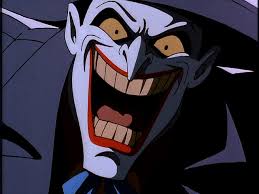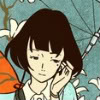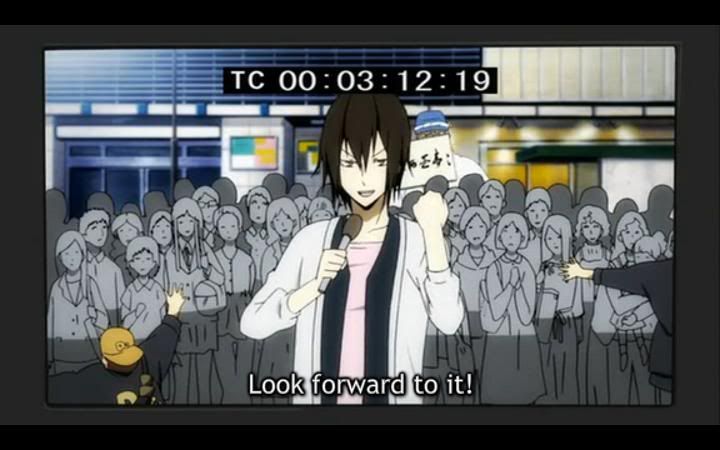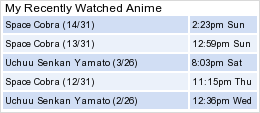What anime are you watching?
Watched the first 4 eps of Tiger & Bunny after hearing about it on the podcast.
I like it so far, the CG stands out but not too jarring. I like the character of Tiger, and Origami Samurai (or whatever his name is) AKA Photobomb is a hoot.
I'm kind of disappointed in Blue Exorcist this week. one of the things I liked about this series was that it had gotten this far hardly any fanservice-y characters, but no more. oh well, the action was well done.
Watched some more Soul Eater. I'm not sure of the numbers but I finished the 'battle for the brew' arc, lots of fun, good action.
Watched this on Adult Swim this week; Missed Bleach and Durarara!!
. FMA:B was great though, and Inuyasha was Inuyasha.
I like it so far, the CG stands out but not too jarring. I like the character of Tiger, and Origami Samurai (or whatever his name is) AKA Photobomb is a hoot.
I'm kind of disappointed in Blue Exorcist this week. one of the things I liked about this series was that it had gotten this far hardly any fanservice-y characters, but no more. oh well, the action was well done.
Watched some more Soul Eater. I'm not sure of the numbers but I finished the 'battle for the brew' arc, lots of fun, good action.
Watched this on Adult Swim this week; Missed Bleach and Durarara!!
. FMA:B was great though, and Inuyasha was Inuyasha.
MAL - CAA MAL club - Avatar from Hyouka
"DaughterOfZion 06:19 - forget love, fudge conquers all. xD"
"Written assignments are never finished, only due." -me
-Speak not unless you can improve the silence.-
MOES: Members Observing Efficient Sigs
"DaughterOfZion 06:19 - forget love, fudge conquers all. xD"
"Written assignments are never finished, only due." -me
-Speak not unless you can improve the silence.-
MOES: Members Observing Efficient Sigs
-

MomentOfInertia - Posts: 1316
- Joined: Tue May 25, 2010 7:21 pm
- Location: Around
Casshern Sins is really episodic. I watched a cour back around when it was airing and then pretty much gave up. I can see why people like it, but without a strong central plot, it couldn't hold my interest.
I'm currently in the middle of going through Full Metal Panic. I watched through most of it years ago, but never actually finished it.
I'm currently in the middle of going through Full Metal Panic. I watched through most of it years ago, but never actually finished it.
-----------------------------------------
"Always seek to do good to one another and to all."
1 Thessalonians 5:15
"Every story must have an ending." - Auron - Final Fantasy X
"A small stone may make a ripple at first, but someday it will be a wave." - Wiegraf - Final Fantasy Tactics
"Always seek to do good to one another and to all."
1 Thessalonians 5:15
"Every story must have an ending." - Auron - Final Fantasy X
"A small stone may make a ripple at first, but someday it will be a wave." - Wiegraf - Final Fantasy Tactics
-

MasterDias - Posts: 2714
- Joined: Tue Jun 03, 2003 4:56 pm
- Location: Texas
Watched episode 14 of Steins;Gate. The ending...
[spoiler]Suzuha is John Titor?!?! O.o I'm highly suspicious that Okabe is her father, to tell you the truth. As far as her mother, maybe it's...Mayuri? XD!! IDK, Mayuri is a better match for Okabe in my opinion, I don't really like Makise >.>[/spoiler]
[spoiler]Suzuha is John Titor?!?! O.o I'm highly suspicious that Okabe is her father, to tell you the truth. As far as her mother, maybe it's...Mayuri? XD!! IDK, Mayuri is a better match for Okabe in my opinion, I don't really like Makise >.>[/spoiler]
"For what use is there in praying if you will only hear what you want to hear." - As I Lay Dying *The Sound Of Truth*
Let's make an AMV together!
Kokoro no Uta The thoughts of an aspiring mangaka (yeah...this is my blog >.>)
Ooh look! I have fanfiction! YAY!!!!!!!
http://www.fanfiction.net/~sevencandlesticks
If you like Tsubasa and Cardcaptors, then you might like what I've written (if I didn't slaughter the series... XD)
He heals the brokenhearted and binds up their wounds - Pslam 147:3
Let's make an AMV together!
Kokoro no Uta The thoughts of an aspiring mangaka (yeah...this is my blog >.>)
Ooh look! I have fanfiction! YAY!!!!!!!
http://www.fanfiction.net/~sevencandlesticks
If you like Tsubasa and Cardcaptors, then you might like what I've written (if I didn't slaughter the series... XD)
He heals the brokenhearted and binds up their wounds - Pslam 147:3
-

AnimeGirl - Posts: 1053
- Joined: Wed Nov 11, 2009 5:51 pm
- Location: California
Lets see what have I been watching recently...
Soul Eater: I am almost done the series with only about 11 episodes left I am excited to see how it ends. I have been loving the series so far and I hope it continues to be awesome. also [SPOILER]I really hate Medusa[/SPOILER]
Hell Girl: This has proven to be a great Horror anime. I love Ai and her crew they are so cool. It is interesting how much they talk of consequences of choices. [SPOILER]I really like how they gave it a plot but also keeping it episodic and an anthology show[/SPOILER] The mystery of Ai and who she and what the Hell Correspondence can do is really interesting and keeps me coming back.
Inuyasha: I started watching this. I just finished episode 4 and I really like it so far. I wasn't sure how I would feel about it but I find it very fun. I look forward to the rest of the series...the extremely daunting 170 episode series plus Final Act...and the movies...ughh
Eden of the East: This is probably the biggest surprise in anime that I have ever seen. I watched the first episode and thought that it was ok, it was enough to bring me back for a second episode but it wasn't really anything special. As I kept watching the show I fell in love with the plot, mystery, and characters. It went from a show that was ok to a show that I would be more than happy to add to my collection. I just watched King of Eden which was awesome and I am now freaking out because I want to watch the next movie but I have to wait till it comes out in the U.S.
Soul Eater: I am almost done the series with only about 11 episodes left I am excited to see how it ends. I have been loving the series so far and I hope it continues to be awesome. also [SPOILER]I really hate Medusa[/SPOILER]
Hell Girl: This has proven to be a great Horror anime. I love Ai and her crew they are so cool. It is interesting how much they talk of consequences of choices. [SPOILER]I really like how they gave it a plot but also keeping it episodic and an anthology show[/SPOILER] The mystery of Ai and who she and what the Hell Correspondence can do is really interesting and keeps me coming back.
Inuyasha: I started watching this. I just finished episode 4 and I really like it so far. I wasn't sure how I would feel about it but I find it very fun. I look forward to the rest of the series...the extremely daunting 170 episode series plus Final Act...and the movies...ughh
Eden of the East: This is probably the biggest surprise in anime that I have ever seen. I watched the first episode and thought that it was ok, it was enough to bring me back for a second episode but it wasn't really anything special. As I kept watching the show I fell in love with the plot, mystery, and characters. It went from a show that was ok to a show that I would be more than happy to add to my collection. I just watched King of Eden which was awesome and I am now freaking out because I want to watch the next movie but I have to wait till it comes out in the U.S.

-

Wolf-man - Posts: 432
- Joined: Wed Feb 17, 2010 5:12 pm
I was finally able to watch and finish Durarara, although not the specials. I... I don't know how I feel about this series, I think it will require a second viewing. I didn't enjoy it as much as Baccano and maybe I was expecting too much but it feels like I missed something that everyone else got which somehow makes the series better than I experienced it to be. I do think that the first half was better than the second though.
-

GeneD - Posts: 1969
- Joined: Sat Nov 10, 2007 10:43 am
- Location: South.
Just finished Cowboy Bebop. Yeah, it's as good as everyone says. And I'm saying that as someone who usually doesn't like episodic series.
[spoiler]I already knew that Spike and Julia were going to die in the end, although I didn't know all the details of how. The ending was still emotionally moving, but I can't help wondering what it would have been like watching it without knowing that. I think that in episode 25, I would have been hoping for a happy ending, and then I would have been crushed when Julia died. I don't think Spike's death would have been a surprise after that, though.
Also, I really want to know what happened to Ed and Ein! I'm sure that Jet and Faye are fine, whatever they're doing, but I wanna know where Ed went and what she did. Would it have killed them to have one of those epilogues that show what everyone's doing? Ah well. [/spoiler]
[spoiler]I already knew that Spike and Julia were going to die in the end, although I didn't know all the details of how. The ending was still emotionally moving, but I can't help wondering what it would have been like watching it without knowing that. I think that in episode 25, I would have been hoping for a happy ending, and then I would have been crushed when Julia died. I don't think Spike's death would have been a surprise after that, though.
Also, I really want to know what happened to Ed and Ein! I'm sure that Jet and Faye are fine, whatever they're doing, but I wanna know where Ed went and what she did. Would it have killed them to have one of those epilogues that show what everyone's doing? Ah well. [/spoiler]
- Mouse2010
- Posts: 348
- Joined: Fri Jan 14, 2011 5:44 pm
- Location: western US
Still working through V Gundam. I'm about halfway through and things are starting to get real.
[spoiler]stupid Katejina stop trying to kill Uso[/spoiler]
[spoiler]stupid Katejina stop trying to kill Uso[/spoiler]
fightin' in the eighties
-

ShiroiHikari - Posts: 7564
- Joined: Wed May 28, 2003 12:00 pm
- Location: Somewhere between 1983 and 1989
Just finished Air. I've heard people say that it's basically Clannad without the after story (or maybe that was another anime?), but I really think it had a unique story and was beautifully animated, although it's also the first story in a while to confuse me. I'm not usually confused very easily. XD
For example:
[SPOILER]Did the whole scene where Yukito came back and then disappeared have any meaning to it? I think that helped extend Misuzu's life, but it really is kind of unclear. I don't really understand why the spirit of Ryuya was passed along just so that one of Kanna's reincarnations could have an extended life. Or is there something I'm missing, and the cycle was somehow broken?
Which brings me to the two kids an the end, the boy and the girl. I have absolutely no clue about them. Absolutely. No. Clue. XD[/SPOILER]
For example:
[SPOILER]Did the whole scene where Yukito came back and then disappeared have any meaning to it? I think that helped extend Misuzu's life, but it really is kind of unclear. I don't really understand why the spirit of Ryuya was passed along just so that one of Kanna's reincarnations could have an extended life. Or is there something I'm missing, and the cycle was somehow broken?
Which brings me to the two kids an the end, the boy and the girl. I have absolutely no clue about them. Absolutely. No. Clue. XD[/SPOILER]
One Piece teaches me to strive for my dreams with all my might.
Clannad teaches me the importance of love and family.
So live strong and realize your dreams, but don't forsake those around you.
[SIGPIC][/SIGPIC]
Clannad teaches me the importance of love and family.
So live strong and realize your dreams, but don't forsake those around you.

[SIGPIC][/SIGPIC]
-

Tenchi - Posts: 53
- Joined: Tue Jun 28, 2011 11:00 pm
- Location: Illinois
I'm finishing up Suzuka. Then I'm starting Gintama.
"And you He made alive, who were dead in trespasses and sins, in which you once walked according to the course of this world, according to the prince of the power of the air, the spirit who now works in the sons of disobedience, among whom also we all once conducted ourselves in the lusts of our flesh, fulfilling the desires of the flesh and of the mind, and were by nature children of wrath, just as the others.
But God, who is rich in mercy, because of His great love with which He loved us, even when we were dead in trespasses, made us alive together with Christ (by grace you have been saved), and raised us up together, and made us sit together in the heavenly places in Christ Jesus, that in the ages to come He might show the exceeding riches of His grace in His kindness toward us in Christ Jesus." Ephesians 2:1-7
http://oribichan94.deviantart.com/
But God, who is rich in mercy, because of His great love with which He loved us, even when we were dead in trespasses, made us alive together with Christ (by grace you have been saved), and raised us up together, and made us sit together in the heavenly places in Christ Jesus, that in the ages to come He might show the exceeding riches of His grace in His kindness toward us in Christ Jesus." Ephesians 2:1-7
http://oribichan94.deviantart.com/
-

aliveinHim - Posts: 615
- Joined: Fri Feb 18, 2011 9:31 pm
- Location: "Hey look! A ninja!" "Where?" *runs off*
D.Gray-man episodes 6-8
I'm getting into this more and more. I've discovered that I really like Komui - he's the Maes Hughes of this show, though he obsesses over his sister and his robot rather than a wife and daughter. (Plus, Komui has a bunny mug and Hughes has duck pajamas :B) I also liked the glimpse into Allen's past; I can tell that if they keep this up and just ramp it up a little, I'll be able to actually care about him. The humor is working now, too - I was actually chuckling rather than just staring blankly at the screen and realizing, "Oh...they turned chibi. It's supposed to be funny now."
And, after discussing it with the friend who recommended this show to me in the first place, I'm switching over to the English dub now. I'll probably watch at least some of the sub so I can see what different characters sound like, but yeah. I wanna hear Todd Haberkorn
I'm getting into this more and more. I've discovered that I really like Komui - he's the Maes Hughes of this show, though he obsesses over his sister and his robot rather than a wife and daughter. (Plus, Komui has a bunny mug and Hughes has duck pajamas :B) I also liked the glimpse into Allen's past; I can tell that if they keep this up and just ramp it up a little, I'll be able to actually care about him. The humor is working now, too - I was actually chuckling rather than just staring blankly at the screen and realizing, "Oh...they turned chibi. It's supposed to be funny now."
And, after discussing it with the friend who recommended this show to me in the first place, I'm switching over to the English dub now. I'll probably watch at least some of the sub so I can see what different characters sound like, but yeah. I wanna hear Todd Haberkorn

You can find out things about the past that you never knew. And from what you've learned, you may see some things differently in the present. You're the one that changes. Not the past.
- Ellone, Final Fantasy VIII

"There's a difference between maliciously offending somebody - on purpose - and somebody being offended by...truth. If you're offended by the truth, that's your problem. I have no obligation to not offend you if I'm speaking the truth. The truth is supposed to offend you; that's how you know you don't got it."
- Brad Stine
- Ellone, Final Fantasy VIII

"There's a difference between maliciously offending somebody - on purpose - and somebody being offended by...truth. If you're offended by the truth, that's your problem. I have no obligation to not offend you if I'm speaking the truth. The truth is supposed to offend you; that's how you know you don't got it."
- Brad Stine
-

the_wolfs_howl - Posts: 3273
- Joined: Thu Mar 01, 2007 11:26 pm
- Location: Not Paradise...yet
I'm making my roommate watch through Boogiepop Phantom, we got through the first half tonight.


[font="Book Antiqua"][color="Purple"]For the love of Christ controls us, having concluded this: that one died for all, therefore all died; and he that died for all, so that they who live might no longer live for themselves, but for Him who died and rose again on their behalf. II Corinthians 5:14-15[/color][/font]
-

Blitzkrieg1701 - Posts: 1884
- Joined: Wed Jun 02, 2004 9:01 am
- Location: Washington, DC (when I'm not in an alternate universe)
Casshern Sins 13 and 14, plus Blue Exorcist 13. Some interesting things are happening in both series. I'm thinking that for me, Casshern Sins is the kind of series best taken in small doses, because it IS repetitive and slow paced, but occasionally you get episodes with a lot of payoff in terms of more backstory being revealed or character development.
- Mouse2010
- Posts: 348
- Joined: Fri Jan 14, 2011 5:44 pm
- Location: western US
Soul Eater Episode 31.
I really like this anime for its action and even more its music.
I also like the characters in it, and the fact that their own stories are shown too. I am reading the manga as well.
And I do NOT like Excalibur. I even wonder why a whole episode was just for him.
I really like this anime for its action and even more its music.
I also like the characters in it, and the fact that their own stories are shown too. I am reading the manga as well.
And I do NOT like Excalibur. I even wonder why a whole episode was just for him.
"Now this is eternal life: that they know you, the only true God, and Jesus Christ, whom you have sent."John 17:3 (NASB)
"By this all people will know that you are my disciples, if you have love for one another.”John 13:35
http://myanimelist.net/animelist/alma01

Anime-Planet.com - anime | manga | watch anime online
"By this all people will know that you are my disciples, if you have love for one another.”John 13:35
http://myanimelist.net/animelist/alma01

Anime-Planet.com - anime | manga | watch anime online
-

alma - Posts: 234
- Joined: Mon May 23, 2011 5:56 pm
- Location: North
Just finished Soul Eater last night. What a fantastic show!
[SPOILER] I was really happy with Medusa's death. I was worried that after all her arrogance her death would just be "meh" but it wasn't. The final battle with the kishin was awesome and epic! I like how his defeat was because of Maka's bravery. It made it more special than just simply using a new weapon or attack. Though as much as I love the show and characters it is not without its faults. The plot where good does feel a bit rushed at the end as many have said before. I felt like after the kishin revived they forgot about him for a while and focused on Aracne who came out of nowhere. Until she found Asura and his face was in her breast until the last 2 episodes. Also there are a couple plot holes. Like the first episode when Maka and Soul had gotten the 99 evil human souls and only had to get 1 witch soul and the only reason they didn't get it was because the witch ended being Blair the cat. So why are they so weak later and getting beat all the time? Shouldn't they be a lot more powerful? Then they forget about that goal for the rest of the show basically. Then there is Excalibur who I love and whereas it was cool to see him more involved at the end of the show his knowledge and serious non-random attitude came out of nowhere. Though even with all of that the show still rocked and I loved every minute of it.[/SPOILER]
[SPOILER] I was really happy with Medusa's death. I was worried that after all her arrogance her death would just be "meh" but it wasn't. The final battle with the kishin was awesome and epic! I like how his defeat was because of Maka's bravery. It made it more special than just simply using a new weapon or attack. Though as much as I love the show and characters it is not without its faults. The plot where good does feel a bit rushed at the end as many have said before. I felt like after the kishin revived they forgot about him for a while and focused on Aracne who came out of nowhere. Until she found Asura and his face was in her breast until the last 2 episodes. Also there are a couple plot holes. Like the first episode when Maka and Soul had gotten the 99 evil human souls and only had to get 1 witch soul and the only reason they didn't get it was because the witch ended being Blair the cat. So why are they so weak later and getting beat all the time? Shouldn't they be a lot more powerful? Then they forget about that goal for the rest of the show basically. Then there is Excalibur who I love and whereas it was cool to see him more involved at the end of the show his knowledge and serious non-random attitude came out of nowhere. Though even with all of that the show still rocked and I loved every minute of it.[/SPOILER]
-

Wolf-man - Posts: 432
- Joined: Wed Feb 17, 2010 5:12 pm
I just finished watching Rurouni Kenshin episode 31, now the show is really starting to pick up! If this keeps up I'll probably end up giving it a 10/10. 


The Lord is my shepherd, I shall not want. He makes me lie down in green pastures; He leads me beside quiet waters. He restores my soul; He guides me in paths of righteousness For His name's sake. Even though I walk though the valley of the shadow of death, I will fear no evil; for thou art with me; Thy rod and Thy staff, they comfort me. Thou dost prepare a table before me in the presence of my enemies; Thou hast anointed my head with oil; My cup overflows. Surely goodness and lovingkindness will follow me all the days of my life, and I will dwell in the house of the Lord forever. Psalm 23
-

AngelicTotoro - Posts: 338
- Joined: Mon Aug 10, 2009 4:21 pm
- Location: My home, The Camphor Tree.
Just started Mushi-shi.
"Before I formed you in the womb I knew you, and before you were born I consecrated you. I appointed you to be a prophet of all nations."
--Jeremiah 1:5

Hit me up on social media!
https://www.facebook.com/profile.php?id=100007205508246<--Facebook
I'm also on Amino as Radical Edward, and on Reddit as Rocklobster as well.
click here for my playlist!
my last fm profile!
--Jeremiah 1:5
Hit me up on social media!
https://www.facebook.com/profile.php?id=100007205508246<--Facebook
I'm also on Amino as Radical Edward, and on Reddit as Rocklobster as well.
click here for my playlist!
my last fm profile!
-

rocklobster - Posts: 8903
- Joined: Mon Dec 20, 2004 1:27 pm
- Location: Planet Claire
No. 6 1-2- Rat's very nice-looking all grown up like that. Other than that, I'm not too impressed with the story so far, but it seems to be getting better. I'm wondering what they can do with 11 episodes.
Bunny Drop 2- More adorableness. I liked how they went more in-depth with how the emergency daydare affected them, how they dealt with it and felt about it. Since this is 11 episodes, I think that it'll only be focusing on the first half of the manga because of the pacing. I don't mind that at all.
Itsuka Tenma no Kuro Usagi 1- any show where there's a scene that sincerely makes me think I ended up watching a hentai on accident gets dropped immediately. I'm not even wasting my time.
Hanasaku Iroha 15- More sweetness. I'm really enjoying this show.
EDIT: And finally finished Gosick, eps. 20-24. Not too shabby, really. I think I'd rate it an 8. Not my favorite at times, but overall a fun ride.
Kamisama Dolls 1-2- okay I rather liked this, too. Maybe I've been craving some action or something.
Bunny Drop 2- More adorableness. I liked how they went more in-depth with how the emergency daydare affected them, how they dealt with it and felt about it. Since this is 11 episodes, I think that it'll only be focusing on the first half of the manga because of the pacing. I don't mind that at all.
Itsuka Tenma no Kuro Usagi 1- any show where there's a scene that sincerely makes me think I ended up watching a hentai on accident gets dropped immediately. I'm not even wasting my time.
Hanasaku Iroha 15- More sweetness. I'm really enjoying this show.
EDIT: And finally finished Gosick, eps. 20-24. Not too shabby, really. I think I'd rate it an 8. Not my favorite at times, but overall a fun ride.
Kamisama Dolls 1-2- okay I rather liked this, too. Maybe I've been craving some action or something.
-

Atria35 - Posts: 6295
- Joined: Sat Mar 20, 2010 7:30 am
Aside from continuing with the stuff of varying quality on Adult Swim (Durarara, FMA: Brotherhood, and InuYasha), I've been watching Princess Jellyfish (episodes 4-6) and Trigun (episodes 3-4).
FMA: Brotherhood and Princess Jellyfish are my current favorites. XD
FMA: Brotherhood and Princess Jellyfish are my current favorites. XD
Hats wrote:"Frodo! Cast off your [s]sins[/s] into the fire!"
EllaEdric 06:53 -IM SO UNEQUIPPED TO BE A MAN ITS NOT EVEN FUNNY.
-

FllMtl Novelist - Posts: 1722
- Joined: Wed May 26, 2010 6:31 pm
- Location: Spa Maria
Kiki's Delivery Service (dub): Well, this actually did not turn out to be one of my favorites among the Ghibli movies I've seen so far  , but it was passably good, so I gave it a 6/10 on MAL.
, but it was passably good, so I gave it a 6/10 on MAL. 
 , but it was passably good, so I gave it a 6/10 on MAL.
, but it was passably good, so I gave it a 6/10 on MAL. 
Saved by grace.

MAL (Anime) - MAL (Manga) - MAL (Profile)
(^ And if you also have a MAL account, please feel free to send me a friend request there! )
)

MAL (Anime) - MAL (Manga) - MAL (Profile)
(^ And if you also have a MAL account, please feel free to send me a friend request there!
 )
)-

MangaRocks! - Posts: 1264
- Joined: Wed Jan 26, 2011 10:10 am
- Location: A room full of wonderful books... :)
Tonight I watched Pretty Cure All Stars DX3 (which comes with a not-at-all clumsy subtitle along the lines of 'Reach the Future! The Rainbow Flower that Connects the World'). I thought in quality it was somewhere between DX1 (solid) and DX2 (shaky) but thankfully closer to DX1. The film did some neat stuff splitting the twenty-one Cures up into different groups, and it brought back the boardgame and Toymajin from the Fresh film.
[SIZE="1"](Refresher: Toymajin is a super robot made and powered by the accumulated anger of abandoned toys.)[/SIZE]
--
I finally got around to watching Index Ineptus Madoca Magica, which was decent, though (as I expected) it didn't live up to some of the more absurd claims made for it. Still, it was good fun.
--
I've also reached the halfway point of one of my longer-term projects, re-watching Legend of the Galactic Heroes. Doing so is very rewarding: besides the pleasure of seeing a good story again, many episodes have at least one major or minor thing in them which assumes a new significance once you know what's going to happen later in the series.
However, while I've ploughed through a good few episodes in the last week or so I'm expecting to run out of steam soon. I'll be surprised if I've finished re-watching the whole thing by Christmas.
[SIZE="1"](Refresher: Toymajin is a super robot made and powered by the accumulated anger of abandoned toys.)[/SIZE]
--
I finally got around to watching Index Ineptus Madoca Magica, which was decent, though (as I expected) it didn't live up to some of the more absurd claims made for it. Still, it was good fun.
--
I've also reached the halfway point of one of my longer-term projects, re-watching Legend of the Galactic Heroes. Doing so is very rewarding: besides the pleasure of seeing a good story again, many episodes have at least one major or minor thing in them which assumes a new significance once you know what's going to happen later in the series.
However, while I've ploughed through a good few episodes in the last week or so I'm expecting to run out of steam soon. I'll be surprised if I've finished re-watching the whole thing by Christmas.
'That blast is blown for me, for I am the prize, and yet am I not dead.'
-

Agloval - Posts: 214
- Joined: Tue Jan 11, 2011 12:33 pm
- Location: The south of England
Just went through Alien Nine, which started off cute then got...not so cute rather quickly. And now searching for the manga in order to see what happens in the end.
"Because the World isn't as cruel as you take it to be." ~ Celty, Durarara!!
Be strong and courageous. Do not be afraid or terrified because of them, for the LORD your God goes with you; he will never leave you nor forsake you."
~Deuteronomy 31:6
--------------------------------------------------------------------------------
We live in a fantasy world, a world of illusion. The great task in life is to find reality. ~ Iris Murdoch

Be strong and courageous. Do not be afraid or terrified because of them, for the LORD your God goes with you; he will never leave you nor forsake you."
~Deuteronomy 31:6
--------------------------------------------------------------------------------
We live in a fantasy world, a world of illusion. The great task in life is to find reality. ~ Iris Murdoch

-

Sapphire225 - Posts: 640
- Joined: Tue Aug 08, 2006 8:49 pm
- Location: U.S.A
Durarara!! ep. 3-8. I just noticed the other day that Heiwajima Shizuo’s name means “peaceful island quiet male.â€
Let others believe in the God who brings men to trial and judges them. I shall cling to the God who resurrects the dead.
-St. Nikolai Velimirovich
MAL
-St. Nikolai Velimirovich
MAL
-

Kaori - Posts: 1463
- Joined: Wed Dec 22, 2004 4:48 pm
- Location: 一羽の鳥が弧を描いてゆく
Legend of the Galactic Heroes: Overture to a New War
This is what I expected My Conquest is a Sea of Stars to be like.
Everything about this movie is excellent. The politics, the tactics, the discussions, the battle itself, this is what I hoped LoGH would be, only it's an hour and a half so I still didn't get the full scale of what makes LoGH, or what I at least thing will make LoGH. The characters were much more interesting, especially a certain Alliance Commodore named Yang Wenli. Yang is a really tragic character, at least in this movie, because he could be saving millions of lives but is stopped by the incompetence of others. He constantly lives with knowledge that in order to save the lives of Alliance soldiers, he must kill Imperial soldiers, and his way of dealing with this is absolutely awesome. Yang is a characters I can really respect, and I can't wait to see the series proper.
Also, I had no idea The Day of Sagittarius was such a direct parody of LoGH.
This is what I expected My Conquest is a Sea of Stars to be like.
Everything about this movie is excellent. The politics, the tactics, the discussions, the battle itself, this is what I hoped LoGH would be, only it's an hour and a half so I still didn't get the full scale of what makes LoGH, or what I at least thing will make LoGH. The characters were much more interesting, especially a certain Alliance Commodore named Yang Wenli. Yang is a really tragic character, at least in this movie, because he could be saving millions of lives but is stopped by the incompetence of others. He constantly lives with knowledge that in order to save the lives of Alliance soldiers, he must kill Imperial soldiers, and his way of dealing with this is absolutely awesome. Yang is a characters I can really respect, and I can't wait to see the series proper.
Also, I had no idea The Day of Sagittarius was such a direct parody of LoGH.
-

Mr. Hat'n'Clogs - Posts: 2364
- Joined: Sun Apr 19, 2009 2:16 pm
- Location: The Roaring Song-City
Mr. Hat'n'Clogs (post: 1491504) wrote:Legend of the Galactic Heroes: Overture to a New War
This is what I expected My Conquest is a Sea of Stars to be like.
I can't wait to see the series proper.

-

TheSubtleDoctor - Posts: 1838
- Joined: Mon Dec 14, 2009 7:48 am
- Location: Region 1
Watched episode 15 of Steins;Gate. This keeps getting more interesting. Can't wait for next week's!
Ooh, and Netflix FINALLY is streaming Part 3 of FMA: Brotherhood, so I watched the first two eps of that. "Interlude Party" was practically a clipshow (first time I've EVER seen that in a non-edited anime) but the second one was good, very interesting. Man, young Pinako looks REALLY PRETTY. I was all like "what HAPPENED?!" XD!!
Ooh, and Netflix FINALLY is streaming Part 3 of FMA: Brotherhood, so I watched the first two eps of that. "Interlude Party" was practically a clipshow (first time I've EVER seen that in a non-edited anime) but the second one was good, very interesting. Man, young Pinako looks REALLY PRETTY. I was all like "what HAPPENED?!" XD!!
"For what use is there in praying if you will only hear what you want to hear." - As I Lay Dying *The Sound Of Truth*
Let's make an AMV together!
Kokoro no Uta The thoughts of an aspiring mangaka (yeah...this is my blog >.>)
Ooh look! I have fanfiction! YAY!!!!!!!
http://www.fanfiction.net/~sevencandlesticks
If you like Tsubasa and Cardcaptors, then you might like what I've written (if I didn't slaughter the series... XD)
He heals the brokenhearted and binds up their wounds - Pslam 147:3
Let's make an AMV together!
Kokoro no Uta The thoughts of an aspiring mangaka (yeah...this is my blog >.>)
Ooh look! I have fanfiction! YAY!!!!!!!
http://www.fanfiction.net/~sevencandlesticks
If you like Tsubasa and Cardcaptors, then you might like what I've written (if I didn't slaughter the series... XD)
He heals the brokenhearted and binds up their wounds - Pslam 147:3
-

AnimeGirl - Posts: 1053
- Joined: Wed Nov 11, 2009 5:51 pm
- Location: California
The Sky Crawlers
Here is a film that has been slammed pretty hard in various places, and I am not sure why. Well, I am partly sure why: people go into it expecting lotsa sweet-action dogfights. Expecting this is to fundamentally misunderstand Mamoru Oshii and the kinds of things he likes to make. His films are more Aronofsky than Bruckheimer, which is to say that they are more about being thoughtful, meaning-laden slow-burners than a string of action set-pieces. If you are in the mood for the former, then Sky Crawlers really delivers. I almost want to compare this movie to a Makoto Shinkai work, but Sky Crawlers is meant to put you in a reverie rather than make you reach for the tissue box. I don't want to give the impression that this movie is impenetrable because it isn't; however, it's vastly more rewarding if you just let it encompass you and also take time to think about it.
So what is Oshii trying to convey in his most recent work? I'll attempt to be abstract so as not to give much away. The Sky Crawlers is about being trapped: trapped in your life, in your situation, in the physical world. It's about being a product of someone's vision rather than being free to make your own; about being misunderstood. But, the central point of the movie is that a human being is able to transcend the trap. S/he can make a choice, even within the trap, that creates a beautiful moment which, in turn, imbues her/his past, present and future with a vibrancy and a meaning. Love can transcend the trap.
Do the character models suffer at times? Yes. Are the machines all disappointingly done in CG (the CG is technically is fine, but I would have preferred hand-drawn)? Yes. Is this movie a slow-paced one? Indeed. I think, though, that if you're an Oshii fan, a Shinkai fan or just a fan of slower, thought-provoking works, you should check this one out.
Tokyo Godfathers
What an experience! I laughed, I cried, I was thoroughly entranced for two hours. I am used to Satoshi Kon being the guy that wants to tell us about the vagueness of the border between appearance and reality. Tokyo Godfathers is anything but that; it is a straightforward story that is heart-warming, hilarious, poignant, and fun. If one were to just read the premise on paper, they might think that this is a film that just should not work. Kon certainly made his central cast a group that doesn't have the broad appeal usually necessary for films to work. TG is about three homeless people, two being middle-aged and one being a gay cross-dresser (the best character, BTW, and not due to "comical" stereotyping)...hardly a group that most can identify with, let alone think "These folks would make a compelling movie cast!"
But, the film absolutely works. Again, I was totally hooked for the entire duration, fascinated by these people Kon was taking us on a journey with. It was such an enjoyable ride, this movie, totally lacking slow and.or uninteresting parts. Something funny, interesting, weird, gasp-inducing or heartstring-plucking was always occurring on screen.
Oh, did I mention it was gorgeous? Yeah, the movie is beautifully drawn and animated. I wasn't too hot on Milenium Actress, but Tokyo Godfathers has made me really eager to check out the rest of Kon's too-brief catalog.
Shin Mazinger Z
Along with Tetsujin 28-go, SMZ is one of the two Yauhiro Imagawa giant robot shows that wrongfully goes un-talked bout. People know about and laud Giant Robo, G Gundam is part of Gundam so, whether people love it or hate it, they talk about it. I don't hear much about SMZ, which is disappointing because I feel that, though this show has a couple of flaws, Imagawa is at or near his best for big chunks of the series.
Though SMZ is a remake of a Go Nagai show (Mazinger Z: the series with the first ever piloted robot), it feels much more like Imagawa. Much as he did for Mitsuteru Yokoyama's characters in Giant Robo, Imagawa breathes vibrancy and complexity into Nagai's cast of characters (and, similarly to his treatment of GR, some characters in SMZ are from Nagai works other than Mazinger Z, such as Violence Jack). Certain villains, in particular Baron Ashura, are wonderfully developed and totally compelling. In addition to Nagai's usual high-octane, hot-blooded manliness, Imagawa's hand adds layers of emotional intensity that the original likely lacks.
The animation and mecha designs are solid. Also, the 1st OP features a fantastic JAM Project song...possibly my favorite one. I was always pumped for the episode after seeing that OP.
There are a couple of missteps taken with the series, though. First is a story-telling issue I have. It's not really a problem...more like an inefficiency. Though each arc of the story makes sense by its conclusion, the viewer is often made to think that things just aren't going to fit coherently together. Again, the endgame of each arc fits the pieces into place, but the execution of that piece-fitting tends to feel off at times. I'm not talking about the good kind of being in the dark about a show's mysteries, where you're anticipating the big reveal at the end. SMZ often made me go, "Wait. How did that happen? Why? How did he/she get there? How did person X know about thing Y?" Then, at the end, Imagawa explains it all. I don't think he's haphazardly making up things at the end to neatly tie up his arcs; Imagawa is a director who plans. Still, I feel that if he told his stories in a more conventional, straightforward way, they would just feel more natural.
The second thing is that the ending is absolutely not an ending. It is totally an abrupt, screeching halt. The final scenes are obviously set-up for a sequel series, but here we are, two years later...without a sequel.
I do think Imagawa fans and fans of robot shows would find a whole lot to like here, with surprisingly well-developed characters and well-animated, nicely choreographed fights.
Also: Mazinger turns into a big fist at some point.
Also, also: Zeus (yup, the Greek God himself is here, and he plays an integral role in the series) has a rocket punch. A ROCKET PUNCH.
Here is a film that has been slammed pretty hard in various places, and I am not sure why. Well, I am partly sure why: people go into it expecting lotsa sweet-action dogfights. Expecting this is to fundamentally misunderstand Mamoru Oshii and the kinds of things he likes to make. His films are more Aronofsky than Bruckheimer, which is to say that they are more about being thoughtful, meaning-laden slow-burners than a string of action set-pieces. If you are in the mood for the former, then Sky Crawlers really delivers. I almost want to compare this movie to a Makoto Shinkai work, but Sky Crawlers is meant to put you in a reverie rather than make you reach for the tissue box. I don't want to give the impression that this movie is impenetrable because it isn't; however, it's vastly more rewarding if you just let it encompass you and also take time to think about it.
So what is Oshii trying to convey in his most recent work? I'll attempt to be abstract so as not to give much away. The Sky Crawlers is about being trapped: trapped in your life, in your situation, in the physical world. It's about being a product of someone's vision rather than being free to make your own; about being misunderstood. But, the central point of the movie is that a human being is able to transcend the trap. S/he can make a choice, even within the trap, that creates a beautiful moment which, in turn, imbues her/his past, present and future with a vibrancy and a meaning. Love can transcend the trap.
Do the character models suffer at times? Yes. Are the machines all disappointingly done in CG (the CG is technically is fine, but I would have preferred hand-drawn)? Yes. Is this movie a slow-paced one? Indeed. I think, though, that if you're an Oshii fan, a Shinkai fan or just a fan of slower, thought-provoking works, you should check this one out.
Tokyo Godfathers
What an experience! I laughed, I cried, I was thoroughly entranced for two hours. I am used to Satoshi Kon being the guy that wants to tell us about the vagueness of the border between appearance and reality. Tokyo Godfathers is anything but that; it is a straightforward story that is heart-warming, hilarious, poignant, and fun. If one were to just read the premise on paper, they might think that this is a film that just should not work. Kon certainly made his central cast a group that doesn't have the broad appeal usually necessary for films to work. TG is about three homeless people, two being middle-aged and one being a gay cross-dresser (the best character, BTW, and not due to "comical" stereotyping)...hardly a group that most can identify with, let alone think "These folks would make a compelling movie cast!"
But, the film absolutely works. Again, I was totally hooked for the entire duration, fascinated by these people Kon was taking us on a journey with. It was such an enjoyable ride, this movie, totally lacking slow and.or uninteresting parts. Something funny, interesting, weird, gasp-inducing or heartstring-plucking was always occurring on screen.
Oh, did I mention it was gorgeous? Yeah, the movie is beautifully drawn and animated. I wasn't too hot on Milenium Actress, but Tokyo Godfathers has made me really eager to check out the rest of Kon's too-brief catalog.
Shin Mazinger Z
Along with Tetsujin 28-go, SMZ is one of the two Yauhiro Imagawa giant robot shows that wrongfully goes un-talked bout. People know about and laud Giant Robo, G Gundam is part of Gundam so, whether people love it or hate it, they talk about it. I don't hear much about SMZ, which is disappointing because I feel that, though this show has a couple of flaws, Imagawa is at or near his best for big chunks of the series.
Though SMZ is a remake of a Go Nagai show (Mazinger Z: the series with the first ever piloted robot), it feels much more like Imagawa. Much as he did for Mitsuteru Yokoyama's characters in Giant Robo, Imagawa breathes vibrancy and complexity into Nagai's cast of characters (and, similarly to his treatment of GR, some characters in SMZ are from Nagai works other than Mazinger Z, such as Violence Jack). Certain villains, in particular Baron Ashura, are wonderfully developed and totally compelling. In addition to Nagai's usual high-octane, hot-blooded manliness, Imagawa's hand adds layers of emotional intensity that the original likely lacks.
The animation and mecha designs are solid. Also, the 1st OP features a fantastic JAM Project song...possibly my favorite one. I was always pumped for the episode after seeing that OP.
There are a couple of missteps taken with the series, though. First is a story-telling issue I have. It's not really a problem...more like an inefficiency. Though each arc of the story makes sense by its conclusion, the viewer is often made to think that things just aren't going to fit coherently together. Again, the endgame of each arc fits the pieces into place, but the execution of that piece-fitting tends to feel off at times. I'm not talking about the good kind of being in the dark about a show's mysteries, where you're anticipating the big reveal at the end. SMZ often made me go, "Wait. How did that happen? Why? How did he/she get there? How did person X know about thing Y?" Then, at the end, Imagawa explains it all. I don't think he's haphazardly making up things at the end to neatly tie up his arcs; Imagawa is a director who plans. Still, I feel that if he told his stories in a more conventional, straightforward way, they would just feel more natural.
The second thing is that the ending is absolutely not an ending. It is totally an abrupt, screeching halt. The final scenes are obviously set-up for a sequel series, but here we are, two years later...without a sequel.
I do think Imagawa fans and fans of robot shows would find a whole lot to like here, with surprisingly well-developed characters and well-animated, nicely choreographed fights.
Also: Mazinger turns into a big fist at some point.
Also, also: Zeus (yup, the Greek God himself is here, and he plays an integral role in the series) has a rocket punch. A ROCKET PUNCH.
-

TheSubtleDoctor - Posts: 1838
- Joined: Mon Dec 14, 2009 7:48 am
- Location: Region 1
Rurouni Kenshin episode 35 - 39.
I find it a little annoying that Misao is so much like Karou when it comes to certain things... but otherwise, I like her.
(And the baby is so cute in the end of episode 39, 'That it is!!' That is now my official nickname for Kenshin- I mean; That It Is. =3)
I find it a little annoying that Misao is so much like Karou when it comes to certain things... but otherwise, I like her.
(And the baby is so cute in the end of episode 39, 'That it is!!' That is now my official nickname for Kenshin- I mean; That It Is. =3)

The Lord is my shepherd, I shall not want. He makes me lie down in green pastures; He leads me beside quiet waters. He restores my soul; He guides me in paths of righteousness For His name's sake. Even though I walk though the valley of the shadow of death, I will fear no evil; for thou art with me; Thy rod and Thy staff, they comfort me. Thou dost prepare a table before me in the presence of my enemies; Thou hast anointed my head with oil; My cup overflows. Surely goodness and lovingkindness will follow me all the days of my life, and I will dwell in the house of the Lord forever. Psalm 23
-

AngelicTotoro - Posts: 338
- Joined: Mon Aug 10, 2009 4:21 pm
- Location: My home, The Camphor Tree.
Been rewatching ARIA.
Whenever Athena is on screen or talking I get a little sad now
Whenever Athena is on screen or talking I get a little sad now

Blessed be the LORD my strength which teacheth my hands to war, and my fingers to fight:
My goodness, and my fortress; my high tower, and my deliverer; my shield, and he in whom I trust; who subdueth my people under me.
神はそのひとり子を賜わったほどに、この世を愛して下さった。それは御子を信じる者がひとりも滅びないで、永遠の命を得るためである.
My MAL Profile. Please check out my Dad's Christian eBook on Facebook.
-

Falx - Posts: 590
- Joined: Tue Nov 10, 2009 4:05 am
- Location: South Africa
I've caught up with translation progress on Yes! Pretty Cure 5, which means the first three-fifths of the series.
Its reputation is 'Precure does Super Sentai', and while every Precure has some similarities to Super Sentai they are more pronounced here (the clue is in the title!). More Cures means a bit more variation, which is nice, and it's not a downright bad show. Sadly but not surprisingly a lot of episodes feel pretty low-budget. The more recent translation work has used the DVD edition, and it definitely feels like some of the most noticeably lacklustre stuff was fixed for the DVDs. Occasionally an episode will stand out a bit, and the last one I saw distinguished itself with a pretty amusing riff on sword'n'sandals Edo-period TV dramas.
The villains are a dysfunctional corporation and the show has a very grim view of corporate life, which is apparently full of bullying, internecine office politics and massive, gaping inefficiencies. I'm kind of wondering why the show took this angle. Precure is normally full of content designed to help socialise its audience into being productive members of society rather than give them a dim (if perhaps accurate!) view of adult life.
--
Its reputation is 'Precure does Super Sentai', and while every Precure has some similarities to Super Sentai they are more pronounced here (the clue is in the title!). More Cures means a bit more variation, which is nice, and it's not a downright bad show. Sadly but not surprisingly a lot of episodes feel pretty low-budget. The more recent translation work has used the DVD edition, and it definitely feels like some of the most noticeably lacklustre stuff was fixed for the DVDs. Occasionally an episode will stand out a bit, and the last one I saw distinguished itself with a pretty amusing riff on sword'n'sandals Edo-period TV dramas.
The villains are a dysfunctional corporation and the show has a very grim view of corporate life, which is apparently full of bullying, internecine office politics and massive, gaping inefficiencies. I'm kind of wondering why the show took this angle. Precure is normally full of content designed to help socialise its audience into being productive members of society rather than give them a dim (if perhaps accurate!) view of adult life.
--
There's a translation of a radio conversation involving Oshii and a guy from Ghibli in which (near the end) Oshii seems to suggest that there are no longer enough animators living with the skill required 'to animate those fighter planes, or even more, move those clouds'. Which is rather depressing.TheSubtleDoctor (post: 1491769) wrote:the machines [are] all disappointingly done in CG (the CG is technically is fine, but I would have preferred hand-drawn)
'That blast is blown for me, for I am the prize, and yet am I not dead.'
-

Agloval - Posts: 214
- Joined: Tue Jan 11, 2011 12:33 pm
- Location: The south of England
Return to Anime and Anime Reviews
Who is online
Users browsing this forum: No registered users and 76 guests







